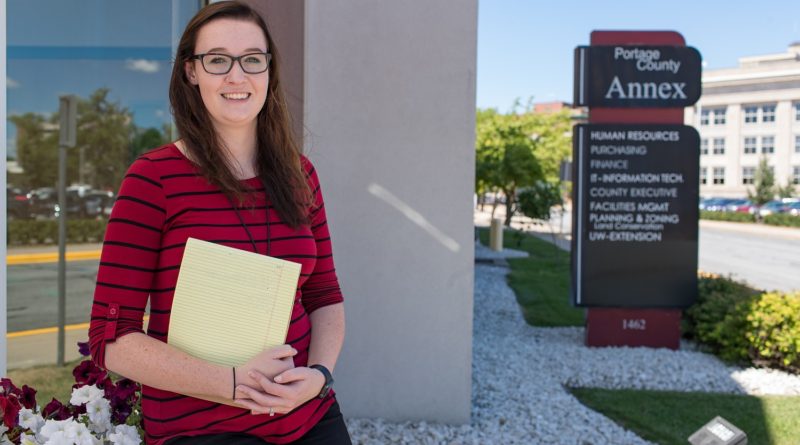UWSP student applies sociology learning to community corrections
For the Metro Wire
If someone sounds startled that Madalyne Fielder works with criminals, she’s quick to clarify: “Actually, I like to think of them as people.”
Fielder is interning with the Portage County Justice Programs this summer and also works with residents of Portage House, a halfway house for adult offenders. Both jobs provide useful experience for her career aspirations in criminal justice. Her goal is to help people stay out of the corrections system.
“‘Criminal or felon’ has such negative connotations. I like busting perceptions. They’re people. They often have kids and wives,” said Fielder, a Stevens Point Area Senior High School graduate.
“Many of them were abused as kids, had drug addictions and made bad decisions. A lot of them are great people.”
She became interested in this career path after a first-year seminar at the UW-Stevens Point introduced her to sociology by connecting cultural and social issues to science fiction. She declared sociology as her major with a criminal justice minor and plans to graduate from UWSP in May 2019, then pursue a master’s degree.
She said she’s learning from “awesome” faculty about a needed profession that serves criminal justice, child welfare, aging and cultural issues.
After three years of coursework, Fielder was ready “to take what I’ve learned and put it to work.”
She is working with the Portage County Drug Court, a restorative justice program and alternative to the corrections system. Developed in April 2017, it is a specialty court, which can be found in other counties as well.
It’s not an easy path, Fielder said. Each week, participants need to go through case management, attend alcohol and other drug abuse treatment including possible drug testing to verify they have not reoffended and attend Drug Court for a progress report. If they remain in compliance, those present applaud the number of “clean” days. If they re-offend, they may be placed in a more restrictive phase.
Those involved in community corrections or alternative-to-jail sentencing programs know that the least restrictive environment is most likely to help the offender find a law-abiding, drug-free path forward, Fielder said. “Offenders do better when they stay in their community.”
Even her father, a retired police officer, was concerned about some of Fielder’s work environment. She has assured him and others that she sees a different side of offenders in community corrections programs when they are treated with respect and have clear expectations. “They are not all good. But I’ve seen more good than bad. Often the difference is they got caught,” she said.
Fielder also is conducting a recidivism study for Portage Co. Circuit Court Judge Thomas Flugaur on people who re-offend in primarily alcohol-related crimes such as operating while intoxicated. “I’ve been able to apply my research skills to analyze data on pretrial and post-sentence supervision programs.”
Her study will provide valuable insight into the effectiveness of programs that target recidivism-related issues. “Our goal is to help the most people in the most effective way,” she said.
Fielder has been an exceptional intern with the Portage Co. Justice Programs, said David Barry, assistant professor of Sociology at UWSP and sociology internship coordinator.
“Fielder’s level of professionalism and work ethic is intense and palpable and has been noted by those at her site placement,” he said. “This, coupled with her sharp ability to bridge her applied sociological training to ‘real-world’ problems, has made her a model example for any UW-Stevens Point intern.”
In addition to Judge Flugaur, Fielder works most closely with Andrea Behnke, Portage County Justice Programs director.

